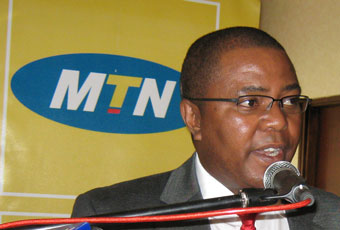
By Patrick Kagenda
MTN has set a precident in acquiring quick money from Uganda’s financial market. It is the first to raise money through a syndicated loan in the country’s history. Will other corporations also follow?
Bank of Uganda Governor Tumusime Mutebile says MTN’s Shs 200 billion syndicated bank loan announced on October 19 ‘is a boost to the Ugandan financial market that could make Uganda a financial giant in the region’.
‘The syndicated loan facility is a new financial innovation in the countries financial sector,’ he said.
Uganda added a milestone to its financial markets sector by raising the first ever corporate financing facility in form of a syndicated loan to the tune of $100 million (Shs 200 billion) that was raised from 11 local and regional financial institutions.
Absa Capital, the investment banking division of Absa Bank Ltd, was sole Global-Coordinator of the facility, while Barclays Bank Uganda Ltd, KCB Uganda Ltd, Standard Chartered Bank Uganda Ltd and Stanbic Bank Uganda Ltd were Mandated Lead Arrangers.
Bank of Africa, Citibank Uganda, DFCU Bank, Ecobank Uganda, Orient Bank, and United Bank for Africa Uganda were the subscribers.
The money raised will be used to expand MTN’s network infrastructure.
Some sector players, however, claim MTN would have been better off issuing a bond instead of the syndicated loan.
They cite two bonds that have been successfully executed on the Ugandan financial sector in the last three months.
Musa Nsubuga, a sales and trade analyst at MBEA stock brokerage firm said the syndicated loan is a good innovation, but a bond would have been a much better deal and it would have been oversubscribed considering MTN`s ratings. “We need such deals passing through the stocks market because they boost confidence in the market which has since kept a bottom line profile since the beginning of the global financial meltdown when investors fled the market,”said Musa.
Until the recent global credit, syndicated loans have been a popular financing vehicle among large corporations seeking to raise money quickly. They were particularly popular for large, financially solid corporations with immense credibility but little room for future growth.
MTN Uganda has recently seen its market dominance nibbled at by new entrants. Some reports quoting data from Mobile World, the country’s five current operators and their market shares are: MTN (41%); Zain (22%); Uganda Telecom (19%); Warid Telecom (17%) and Orange (2%).
A sixth network, I-Tel launched its network last month.
Bonds are, however, making a come-back internationally.
In fact, the MTN facility was issued under an innovative structure similar to a Medium Term Notes Program used for the issuance of bond securities.
ABSA Capital Banker, Marouan Selmi, is quoted saying the innovative structure of the facility allows MTN Uganda to enter into US$ 150 million equivalent of senior secured facilities on an ongoing basis, which is a first in the syndicated financing market worldwide.
This means MTN has designed its debt offer to cover even future financing needs by another US$ 50 million because a Medium term Note can be used for constant cash flows.
Themba Khumalo, the Chief Executive of MTN Uganda said they went for a syndicated loan because they urgently needed money for this year’s investment.
On why the MTN is not cross listed so as to raise money through an Initial Public Offer (IPO), Khumalo said, ‘from a policy point of view MTN Uganda does not have the liberty to cross list on the Ugandan bourse but that will be looked at in the future by the MTN group the parent company of MTN Uganda’.
Simon Rutega the Chief Executive at the Uganda securities exchange said,however, that ‘raising money through a syndicate of banks has a positive effect since it is an additional source of project financing. An issuer pools resources from a group of banks-syndicated loan. This is a sign that the financial markets are beginning to obtain some depth and have more options’.
“This is complementary to the stock market, it brings competition. We need to understand the terms and cost of raising this money for example vis a vis issuing long term bonds and note programs on the stock market. Notes are being issued for 14-14.5% today by more or less the same grade of issuers”.
“We need to compete but the issuer ultimately makes the decision on which option to exercise and which one is more cost effective for his needs,” Rutega said.
Information availed to The Independent by an insider who preferred not to be named said the MTN loan has a 17%interest to it. The money is however committed in local currency to avoid fluctuation in foreign exchange.
 The Independent Uganda: You get the Truth we Pay the Price
The Independent Uganda: You get the Truth we Pay the Price


